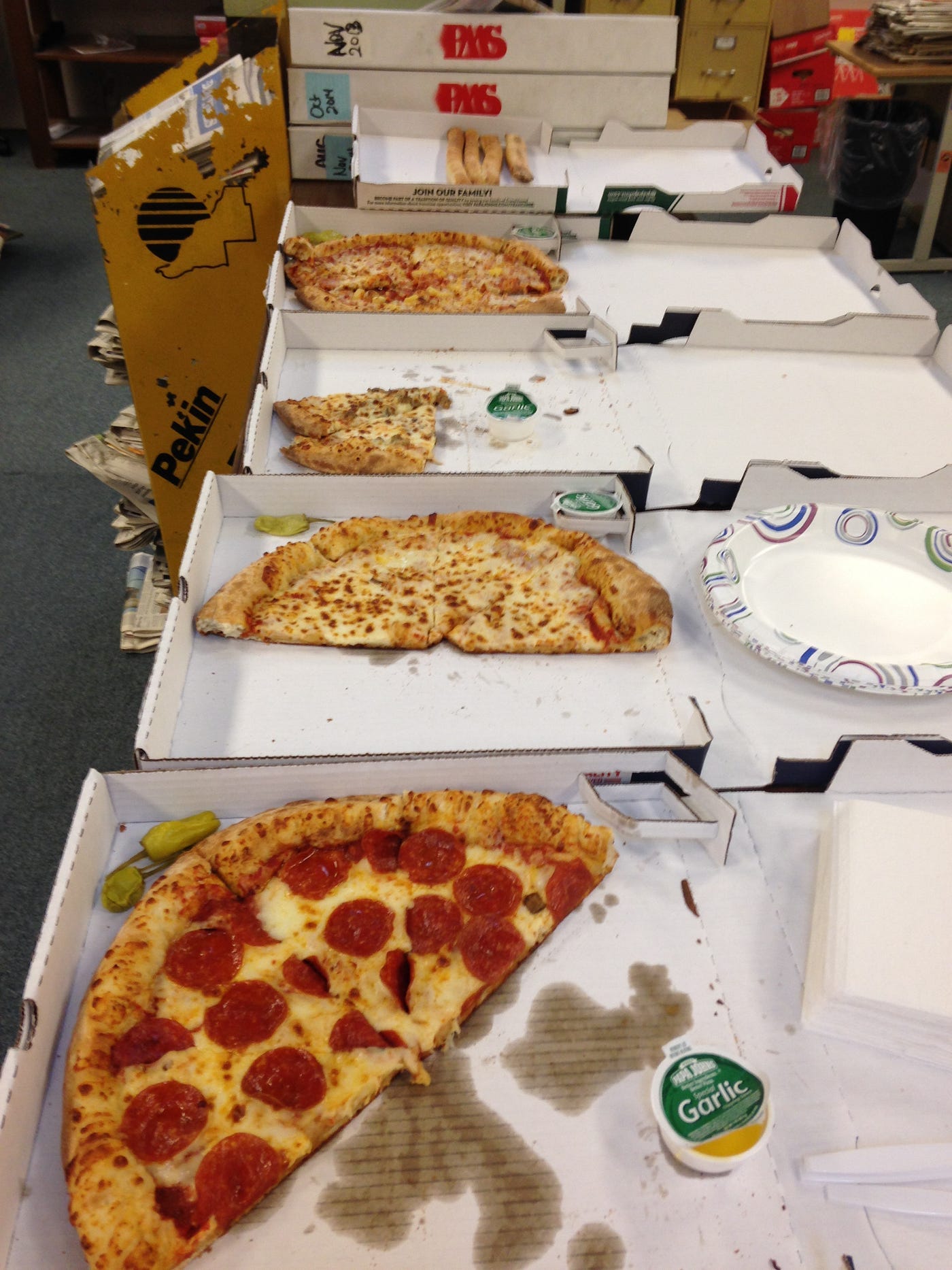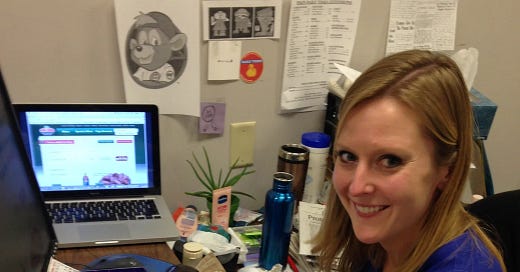
I plan to order a pizza tonight, even though I don’t eat pizza anymore, in hopes of repeating the experience Proust got when he bit into that madeleine.
This is a hard time for those of us who used to work in a newsroom and don’t anymore. I was in a newsroom when the Challenger blew up and I was in one on 9/11 and on many other important occasions; it hurts not to be in one tonight.
If you’re reading this, I’m sure you’re one of the people who knows exactly what is at stake.
I remember the old-time election nights
We were an afternoon paper back in the day, so after everyone else went home after writing stories and taking pictures, I’d work alone through the night collecting and processing all the information. In the wee hours of the morning, the rest of the staff would return and we’d put the paper to bed about 11:30 a.m. so the downtown crowd could read it over lunch.
Our main concern was the local races. People would get the results of the national races from TV, but they would need to read our paper to learn about local contests.
When the rumble of the press began, I’d make my way to the pressroom and grab a damp copy from the line. Pride would wash through me.
And then I’d go home to take a nap, feeling I’d done God’s work.
It still hurts that I’m not in newspapers anymore
Until 2015, I was the editor of a small daily, and that meant covering lots of local elections. Pre-internet, that meant at least one staff member would be parked in the county clerk’s office most of the evening. We’d watch the election judges bring in the ballots, and we’d watch them feed the ballots into a counting machine.
Eventually, we used the internet to watch as a new precinct got added in, and we only went to the county clerk’s office to pick up some color and quotes and that sort of thing.
We had our own version of the ‘red mirage’
In county-wide offices, the precincts located closest to the courthouse would usually be the first ones counted. So we understood not to get too excited about how a race looked after the first few precincts came in. Closer to the county seat, Democrats got a bit more support. Call it a “blue mirage.” The outlying rural counties were as red as could be, and they generally arrived later.
In our local offices, the Associated Press wasn’t calling winners; we were. But the process was the same. If Candidate A had such a lead that there was no mathematical possibility of Candidate B winning, I would call it for A.
It’s too bad everybody doesn’t have the civics education you get working in a small newsroom. Very few people today are able to get the kind of first-hand knowledge I have, and that’s why Trump’s lies land so well with them. He plays them like suckers and they love him anyway.
Election-night pizza was the best part
Scrooge had nothing on newspaper publishers. We were paid shit. Our benefits were less than shit. The paper paid a tiny fraction of the federal mileage reimbursement, which cheated the staff members who had to drive around a lot.
We were expected to give so much of ourselves and in return we were paid so little that everyone either got help from their parents or a better-paid spouse or worked several side gigs to make it.
If you’ve read The Trailer Park Rules, you might have thought the experiences of Jonesy, the newspaper reporter, were overdone. You can read the first two chapters free here, or buy the book here.
But if you’ve ever worked at a small newspaper, you’ll know that none of the abuse Jonesy has to endure is an exaggeration at all. (I hear from a lot of journalists and former journalists who say they feel validated by the Jonesy scenes.)
But we did get one perk. On election night, we were allowed to order several pizzas. Election-night pizza is the best pizza. I don’t eat pizza anymore, and haven’t had election-night pizza in a decade, but I can tell you there’s no other pizza like it in the world.

For one thing, most of us were too poor to afford pizza. For another, shared newsroom pizza was almost like communion. For one night, we were in the trenches together. After we became a morning paper like everyone else, the late-night pizzas kept us going when we faced impossibly early print deadlines that put us in conflict with late voting results.
Everyone turned into a giant ball of stress that could be partially — only partially — tamed with a slice of cooling cheap pizza, the congealing mozzarella making it extra chewy. Like cows contemplatively chewing their cud, we worked our way through the slices and debated whether we could call the county board race tonight or whether we’d have to write a vague story and report the results online later.
If I were running a newsroom tonight, I don’t think pizza would be enough
Long before my time, reporters usually kept a bottle in their bottom drawer. That will get you fired now. Plus, I doubt a bottle of Jack would do the trick. Are we looking at a return to normalcy, or are we going to put the Nazis in charge? Even if Kamala Harris wins, we can never un-know the things we’ve learned about some of our fellow citizens.
One of the subtexts of The Trailer Park Rules is memory. Jonesy, the impoverished reporter, is writing a sci-fi novel called The Happy Place.
In Chapter 22, Jonesy describes the plot of his novel:
… scientists had designed a way to fully immerse you into a memory. It involved a microscopic implant that was placed specifically into the portion of your brain where that memory was stored. You were inserted into a sort of MRI machine and asked to concentrate on the memory you wanted optimized. That part of your brain would light up, and they’d very carefully introduce the implant.
One of the main characters of his book wanted to optimize his memory of a trip he had taken to Paris. It cost more to optimize the memory than it had taken to pay for the trip in the first place, and he had to borrow the money.
But at first, it was worth it. He enjoyed lying in bed, closing his eyes and being back in Paris. He had chosen the most stereotypical part of the trip. He could experience sitting down at a sidewalk cafe and ordering a croissant and a cappuccino. He could feel the flaky bits of the croissant breaking away as he brought his teeth together. He could taste the milky foam and the strong espresso of the cappuccino. He could feel the cobblestones under his feet and could see the Eiffel Tower in the distance. He could people-watch all the Parisians walking by and it was, in every sense, just like being there again, except that he retained a faint consciousness that he was not truly there, but was reliving it.
If there were a fire or something, he could snap himself back into reality at will. Otherwise, it really felt like he was there.
The problem was, the man had gone through a breakup and a job loss soon after this, and instead of fixing his life, he preferred to lie in bed.
“I’m going to Paris,” he’d say. He wouldn’t look for a job, wash his sheets, or, eventually, eat anything. He could escape every unpleasantness by “going to Paris.”
We’d all like to relive our best memories
I know what memories I’d optimize: Holding my newborn babies. Certain highlights in my newspaper career. The mind-altering feeling of falling in love with the Dutch man I’m now married to on my first trip to Europe.
Maybe someday, I’ll whisper secrets to my grandchildren: “This is what democracy was like,” I’ll tell them. “You know. In the before times.”
Or maybe it will be OK, and our memory will just be this: “Do you remember how close we came to losing it all?
“Thank God he lost.”
About Michelle Teheux
I’m a writer in central Illinois. My latest novel is The Trailer Park Rules, and my latest nonfiction book is Strapped: Fighting for the soul of the American working class.











Upgraded to Founding to help with the pizza!
"Maybe someday, I’ll whisper secrets to my grandchildren: "“This is what democracy was like,” I’ll tell them. “You know. In the before times.”"
After last night, we are there now. In about four years, I expect to be telling my grands this very thing.